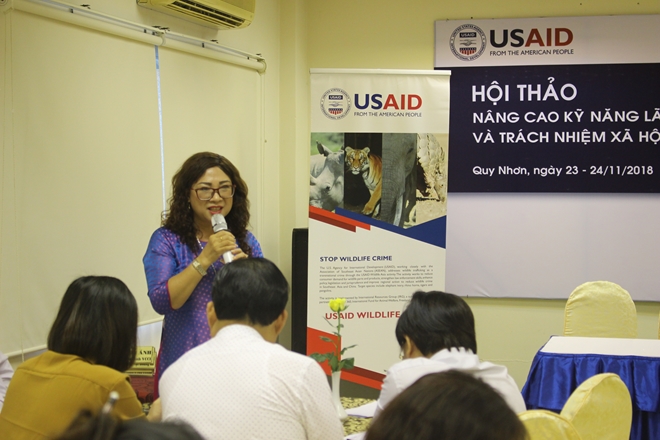Businesses in Vietnam pledge to fight illegal wildlife consumption
 |
At the workshop, leaders from 25 business associations developed an action plan to integrate wildlife protection into their corporate social responsibility (CSR) activities. The leaders also pledged in writing to use their influence to inspire others and step up as champions to protect endangered wildlife species.
“By pledging to be agents of change, these leaders can affect policy decisions in their organizations and disseminate key messages through their networks -- all of which help drive Vietnam towards a complete cessation in illegal wildlife trade and consumption,” said Michael Greene, USAID/Vietnam Mission Director.The workshop was held as part of USAID Wildlife Asia’s Chi Phase III Initiative, a social marketing initiative geared towards reducing demand for rhino horn and other illegal wildlife products. The previous two phases of this Initiative, led by wildlife trade monitoring network TRAFFIC, have overseen the training of more than 20,000 business people on incorporating wildlife-protection into their CSR activities.
Business people are a specific target audience of the Chi Initiative as they have been identified as a key rhino horn user group in past TRAFFIC research. High-profile companies that have joined the initiative include the Vietnam Post and Telecommunications Group, Sun Group, Quang Vinh Ceramic Company, and the Body Shop.
Da Nang, along with Hanoi, Ho Chi Minh City, Hai Phong, and Can Tho, is a key city for USAID Wildlife Asia program activities. Lying on the north-south transport axis of Vietnam, Da Nang was identified in USAID-commissioned research as a market and transit hub for the country’s illegal wildlife trade. In 2018 alone, this port city has seen at least eight seizures of illegal wildlife products, including six tons of pangolin scales and two tons of ivory. More broadly, Vietnam is a leading consumer of endangered species, especially rhino horn, pangolin scales, ivory and tiger bone.
At the workshop, the 35 participants learned how to apply social and behavior change communication approaches and CSR practices to combat the illegal trade and consumption of wildlife in Vietnam. Once trained, business association leaders can then spread anti-trafficking messages throughout their networks, their companies, their clients and beyond, contributing to a change in social norms.

